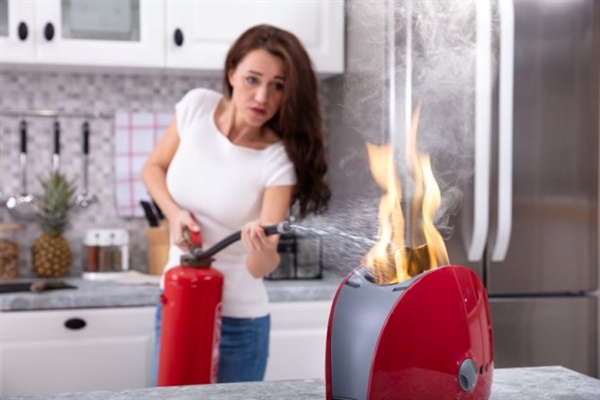Kitchen Fire Safety Tips

When you’re cooking a beautiful meal for your family or friends, you’re thinking about details like food presentation and how much everyone will enjoy what you’re serving. The last thing you want to think about is the possibility of a kitchen fire. But unfortunately, kitchen fires and related injuries are always a possibility.
Thankfully, with a little planning and kitchen safety, you can dramatically reduce your chance of a kitchen fire. In this post from Restoration Network, we’re sharing our top kitchen fire safety tips so you can stay safe while you’re perfecting your omelet recipe. Check out these tips and if you ever need fire damage restoration, we’ve got you covered.
Safe Cooking Tips
Safe cooking practices are your first line of defense against kitchen fires. Use this advice to stay safe in the kitchen:
1. Dispose of grease properly.
When you’re cooking with hot grease, be sure to let it completely cool before disposal. Never pour oil or grease down the drain. Instead, collect your cooled grease into a metal can and then place it in the trash can once the container becomes full.
2. Keep a fire extinguisher on hand.
Keep a fire extinguisher underneath your sink and make sure everyone in your household knows how to use it. The best fire extinguisher for kitchen use is an A-B-C extinguisher, which is rated for standard material fires, grease fires, electrical fires, and more. If you have to use your fire extinguisher, be sure to replace it as soon as possible
3. Keep others safe.
Don’t allow young children within three feet of hot food prep areas. As a general rule, don’t make a habit of allowing others in the cook spaces as this increases the chance of an accident or injry. Additionally, get into the habit of turning handles inward toward the back of the stove so they can’t be grabbed or bumped.
4. Cook safely.
Never prepare food while intoxicated. Don’t wear loose-fitting clothing while you’re cooking, and be sure to keep your hair pinned back and roll up your sleeves.
5. Minimize clutter.
It’s easy to let clutter get the best of you, especially when you’re cooking a meal for a large group. But anything that gets close to your cooktop or hot appliances could pose a potential safety threat.
Take the time while you’re cleaning to clear away unnecessary clutter, and keep your cooking equipment clear of crumbs, grease, and dust since these can build up in appliances. Keep your cooktop clear of anything combustible like food packaging or potholders. Don’t leave combustible items anywhere on or near your stove.
6. Keep an eye on your stove.
Don’t make the mistake of stepping away from your stove even for a minute if there’s something on the burner. If you do have to leave for a moment, turn the burner off first. Finally, check your food regularly even if it is in the oven or another cooking appliance and use a timer to make sure you don’t overcook your food. Thanksgiving is one of the leading opportunities for house fires because people will leave food cooking in the oven while they’re outside the home. Don’t make the mistake of leaving your home while anything is cooking.
Handling a Kitchen Fire
How you handle a kitchen fire can mean the difference between a minor emergency and a serious disaster. Knowing what to do and remaining calm is essential to ensuring the best possible outcome.
Grease Fires
Never throw water on a grease fire. Even a tiny amount of water will become superheated in oil or grease, causing it to erupt. Instead, you need to smother a grease fire. Follow these steps:
1. Cover the fire with a metal lid or baking sheet. Don’t touch this until it’s completely cooled.
2. Shut off the heat source.
3. Smother the fire with salt or baking soda.
4. If necessary, use a Class B dry chemical fire extinguisher.
5. If you can’t safely put out the fire, get everyone out of the house, close the door behind you, and call 9-1-1.
Microwave and Oven Fires
Your primary goal with an oven fire or microwave fire is to keep it contained. Close the door of the oven or microwave and keep it closed until the flames are out as this helps to contain the fire. Turn off the heat and let the fire burn out.
Twin Cities Fire Damage Repair Services
Even when you’re careful in the kitchen, accidents can happen. Fortunately, it’s easy to get your life back on track with our professional fire damage repair experts from Restoration Network. Whether you’ve got water damage, smoke damage, or fire damage, we’ve got you covered with a complete range of fire restoration and repair services.
When you need fire restoration services in the Twin Cities area, Restoration Network offers free inspections and 24/7 emergency services. We’ll get you your kitchen back fast. Give us a call at 612-564-0202 or contact us online today.